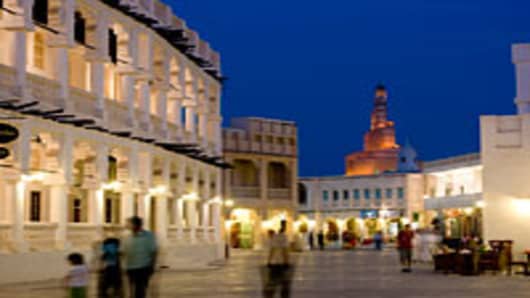Part of the bet of investing in frontier markets is that they will eventually mature into emerging markets. And that may happen for a couple later this summer, analysts told CNBC.
The question then, for the third consecutive year, is whether Qatar and the United Arab Emirates will be reclassified from Frontier Market (FM) to Emerging Market (EM) as part of the MSCI annual market review.
Frontier markets is a term used to describe countries with lower market capitalization and liquidity which are at an earlier development stage than emerging markets.
When the wave of unrest enveloped the Middle East and North Africa(MENA), many investors made a run for it. Even regional markets where no immediate risk was identified saw substantial outflows.
Some of that money has now returned, while the International Monetary Fund has revised the growth rates upwards for several petrodollar economies in the Gulf.
Previous attempts to reclassify Qatar and the UAE have been futile and a decision is expected in June.
"Both countries deserve it, out of many reasons. I think it’s highly likely it will happen.After all, they are considered emerging economies," Haissam Arabi, CEO of Dubai-based Gulfmena Investments, told CNBC.
At a recent conference in Abu Dhabi, Manuel Rensink, the head of MENA at MSCI, said that the process was "moving at a positive pace, even as certain issues are under review, particularly the implementation of delivery versus payment system (DVP)".
Kicking off the global settlement standard is acknowledged as key for an upgrade consideration by MSCI.
Additional Hurdles
The chief of Dubai’s bourse, Essa Kazim, said last month that he hoped the development would assist a possible upgrade, "which will help attract more international mutual funds".
United Arab Emirates has met all conditions for an upgrade to the coveted emerging market status from influential index complier MSCI, a senior official at the Abu Dhabi exchange said on Thursday, according to Reuters.
"The checklist that they (MSCI) had. We got ticked in all except DvP. Now that is ticked. We are positive," Rashed al Baloushi, deputy chief executive, told the news agency
The adoption of DVP proved initially simulative for local bourses, but momentum stalled somewhat in the UAE when it emerged that the deadline for brokerages to switch to the new settlement system had been extended to May 29.
The DVP in Qatar on the other hand was launched on April 11. But there are additional hurdles that are translating into continued skepticism, such as foreign ownership limits.
Qatar typically restricts foreigners from owning not more than 25 percent of shares in a company, while in the UAE the cap is at 49 percent.
Peter Gotke, Vice President at BNY Mellon, told reporters in Doha that "on the foreign ownership side, there are companies here in Qatar that have managed to get permission to ramp up to 49 percent", possibly indicative of a "flexible situation".
Large-cap stocks are the ones likely to make big moves off an MSCI upgrade, given the conditions for inclusion.
Analysts cite sector bias towards real estate and banking in the UAE. Credit Suisse specifically places Emaar Properties, DFM and DP World on its list.
In Qatar, shares such as Doha Bank, QNB, Qatar Gas and Industries Qatar were cited most in a survey of analysts by CNBC.
Apart from attracting more mutual funds, analysts believe that there would be also be an increase in IPOs.
A Credit Suisse note suggests there would be an equity fund flow of up to $1.74 billion into the UAE and Qatar, with the latter receiving about $1 billion.
Qatar would thereafter account for 0.22 percent and UAE just 0.13 percent of the total MSCI EM index. Others are more upbeat about the impact.
Gotke says that "with PE ratios in Qatar relatively lower than in other parts of the region, $2 billion itself could be a very conservative number".
Volumes on candidate indices indicate foreigners have trended towards being net buyers as of late.
There is a lively debate among analysts and participants alike about how beneficial an MSCI would really be. A common argument is that the two indices would be too small for active funds chase a rebalancing.
Arabi does not entirely agree. "Let’s not forget it you’re an ETF, you have a tracking error to maintain and you don’t want to be off". The two countries would not be the first in the region to join the MSCI EM index.
Turkey already enjoys a representation of 1.45 percent (with 19 companies), Egypt 0.34 percent (with 11 companies) and Morocco 0.15 percent (with 3 companies).
It would not be until 2012 before the upgrade, if successful, would become active.



